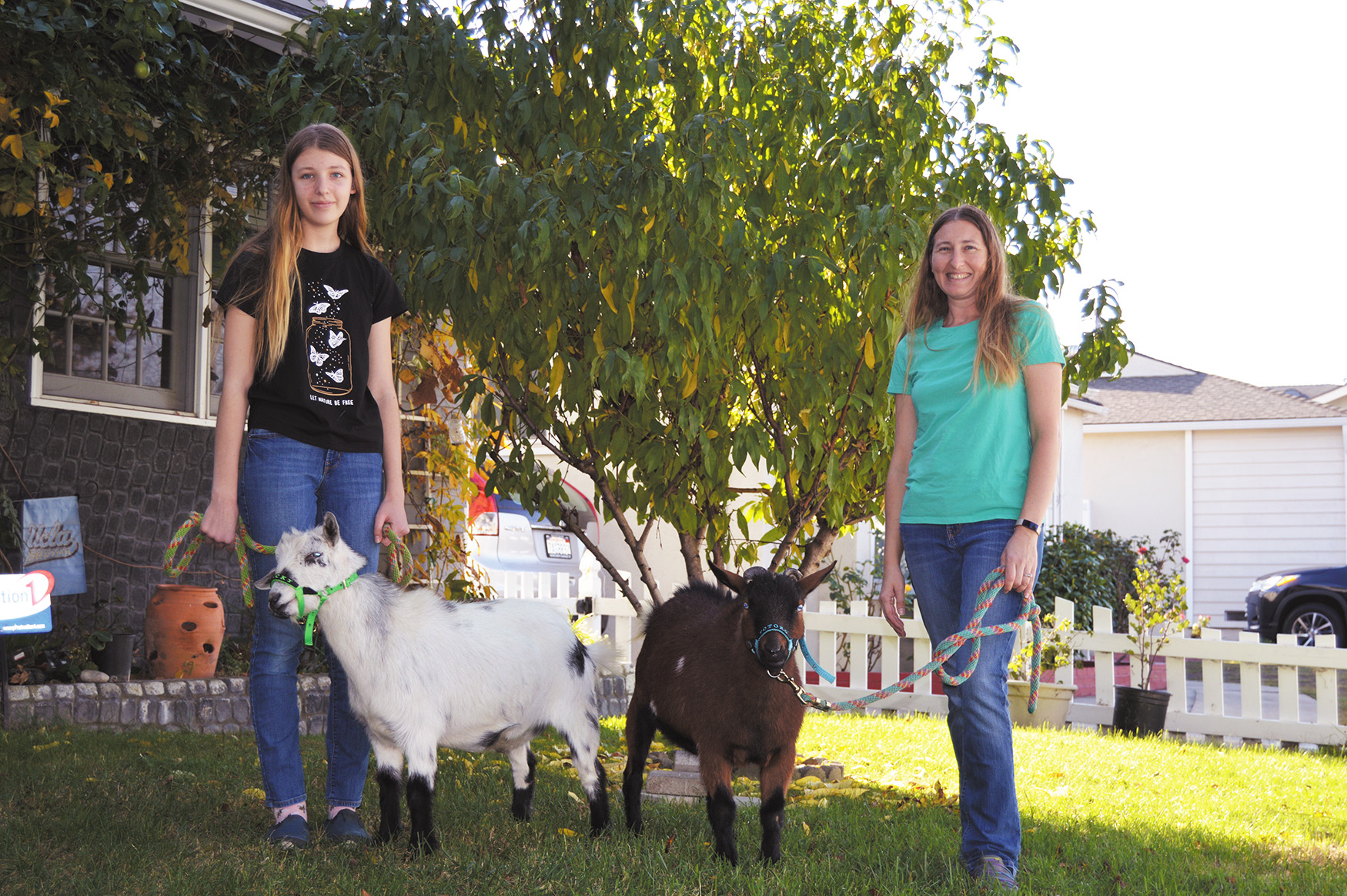Who would have thought that in 2020 goats would be trending? Well, they are! Goats became social media sweethearts back in 2018-2019 with the emergence of goat yoga and the endless videos of goats on trampolines, goats in pajamas and many more goat related viral sensations. It is true that goats are cute and cuddly and highly entertaining, but they also are becoming a new type of therapy animal that can enhance the human-animal bond while transforming lives and promoting healing.
According to PetPartners.com, the leading organization in certifying therapy animals, “Therapy animals can provide physical, psychological and emotional benefits to those they interact with, typically in facility settings such as healthcare, assisted living and schools.” But Pet Partners and other certifying organizations do not yet recognize goats as suitable for certification as therapy animals. One Westchester resident is working to change that. After seeing the benefits that goats can provide, especially in school settings working with children with special needs, Adriana Jakobsen has set out to put goats on the therapeutic map.
Jakobsen is an animal behaviorist and received her degree from UCLA in animal behavior.
Said Jakobsen, “UCLA did not offer any animal-related majors [when I studied there], so I started as pre-med with intentions of continuing on to veterinary school. Two years in, I realized my passion was behavior rather than medicine. I was then able to take advantage of UCLA’s independent major program and put together a curriculum with courses offered through various departments.”
She went on to spend 10 years working and studying a monkey colony at UCLA. Her focus was studying male dominance by looking at the monkey’s brain chemistry and behavior.
She put that training to use when she moved to Westchester, began a family and rescued two Nigerian Dwarf Goats that were bound for the meat market, Lucky and Totoro. The pair’s sweet disposition and ability to bring smiles to everyone they encountered were the inspiration for Jakobsen to set out to get them recognized as therapy animals.

But with no organization to train, test and certify the goats, Jakobsen partnered with a woman who raises and certifies mini horses as therapy animals to develop their own program. Part of the training, among many other things, for all therapy animals is they must be evaluated on their ability to safely interact with different populations, and their handlers must be trained in best practices to make sure that all interactions support animal welfare. As a result of her hard work and training, one year ago, Lucky and Totoro completed their training and passed the program they put in place.
“Now that I have been through the process, I feel confident in my abilities as an animal behaviorist to train future animals for therapy work regardless of the species,” said Jakobsen.
One important thing to note, therapy animals are not service animals. Service animals perform tasks for people with disabilities and are legally protected by the Americans With Disabilities Act, whereas therapy animals are not. Service animals are trained and assigned to work with a specific individual, while therapy animals generally visit hospitals, schools, assisted living facilities and attend special events; they do not work one-on-one.
You may be asking, but why goats? Therapy animals have been around for decades and most people think of dogs, cats or maybe mini horses. It has been shown that exposure to animals affects our bodies by increasing oxytocin levels (the “bonding hormone”), increasing dopamine levels (a neurotransmitter associated with rewards), decreasing cortisol levels (the “stress hormone”), decreasing blood pressure and can improve PTSD/depression/anxiety treatment regimens. In addition to all these physiological changes in the body, animals also provide non-judgmental affection and attention. This is where goats really shine. Properly trained goats do not need to be rewarded with food–they can be rewarded with affection. They also don’t necessarily need a human bond to interact like some dogs do; goats will freely give their love and affection to anyone. They also are docile and calm and as Jakobsen points out, they are hearty and tolerant. Perhaps most importantly, goats are entertaining, which can help provide happiness and laughter, a helpful tool when interacting with someone who needs some comfort.
With close community ties with WISH Charter Schools, Jakobsen had hoped to incorporate Lucky and Totoro into programs at or around the school. While the pandemic has put a hold on some of those ideas, she has opened her yard for students to receive community service hours by helping to care for the goats, learn about farm animals and general animal education. Special needs students are also welcome to spend time with the goats to experience the calm, therapeutic energy that Lucky and Totoro exude.
She continues to have the duo participate in socially distant events as well, like the Halloween Scavenger Hunt, and sometimes just has them in her front yard for the neighborhood to enjoy. Anytime the goats are in town working as therapy animals, Jakobsen’s ninth grade daughter, Klarity, who is a huge animal lover just like her mom, helps as her assistant.
“I really want to be a resource for community events,” said Jakobsen. “Using Lucky and Totoro, I want to help as many people as possible.”
The future is bright for Lucky, Totoro and the whole Jakobsen family (including their three chickens, a dog, two cats, a rabbit, a guinea pig, two hamsters and they soon will have a mini horse too!) because the family is working to build a nine-acre animal sanctuary in San Diego. While Jakobsen has been busy with all aspects of animal rescue here in Westchester, through fostering animals, helping to re-home animals and being a resource for animal issues in the community, with her sanctuary in San Diego, she will be able to continue her efforts on a much larger scale and grow her nonprofit, Future for Animals. She is looking forward to helping more animals find homes, providing more opportunities for animal education and continuing training therapy animals, including goats!
Jakobsen sums up her hopes and dreams for her animal sanctuary in this way, “I have been benefiting from the company of animals to calm my anxiety since I was a child and have had a lifelong desire to learn how I can meet their needs in the best way possible. They bring my family and me so much joy and I want to share that with others who may not be able to adopt their own.”
Want to learn more about Lucky and Totoro and their therapy animal work? Email futureforanimals@gmail.com for more info.
By Lydia Smith.
Posted December 2020.

